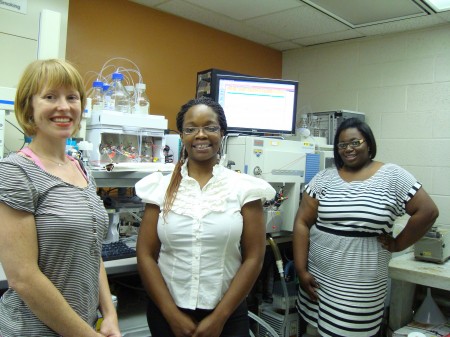 The Johns Hopkins Department of Pathology’s Clinical Chemistry Division will soon be offering testing in support of pain management and drug rehabilitation clinics. The Mass Spectrometry Laboratory of Dr. William (Bill) Clarke, the Director of Toxicology for the Hospital’s Core Laboratory, is developing a panel for qualitative analysis of 47 drugs, including those commonly used in pain management, and for drugs of abuse.
The Johns Hopkins Department of Pathology’s Clinical Chemistry Division will soon be offering testing in support of pain management and drug rehabilitation clinics. The Mass Spectrometry Laboratory of Dr. William (Bill) Clarke, the Director of Toxicology for the Hospital’s Core Laboratory, is developing a panel for qualitative analysis of 47 drugs, including those commonly used in pain management, and for drugs of abuse.
Monitoring of patients in pain management or drug rehabilitation treatment is important to ensure compliance with treatment plans. Patients may self-adjust dosing schedules to either divert pills to sell or stockpile pills to later take extreme doses. Clinicians also monitor these patients to ensure they are not taking non-prescribed or illicit drugs which may cause dangerous drug-drug interactions. Currently, clinicians treating patients with chronic pain are limited in their ability to assess whether patients are compliant with dosage recommendations. These clinicians must often rely on subjective metrics to gauge compliance. These measures include clinical observation of patients, pill counts, and interviews with families and peers to determine whether a patient is taking medications as prescribed. Laboratory tests provide a more objective system with which to assess compliance, but immunoassays – the most widely-used type of testing – are typically class-specific tests and are not able to distinguish between compounds within the same class, like the opiates codeine and heroin. In addition, immunoassays are limited because of their reliance on specific antibodies and general unknown screening of patient specimens is not possible.
Mass spectrometry-based methods provide a solution to these problems with a testing platform that allows for unambiguous identification and quantitation of these drugs based on their individual molecular composition and fragmentation data. Mass spectrometry, when performed in full scan mode, can detect any compounds present in a patient sample. Once mass spectrometric data is collected, it is compared against drug library data and from that library, candidate analytes are identified. Mass spectrometry also supports the detection of drug metabolites, which widens the drug detection window and allows for identification of spuriously positive samples which may have been adulterated to cover diversion of drugs.
With more powerful laboratory tools, clinicians will be better equipped to detect and solve problems of diversion and non-compliance in pain management and drug rehabilitation clinics.
Autumn Breaud
Clinical Research Specialist
Research Toxicology/Clinical Chemistry Lab
The Johns Hopkins University
Department of Pathology